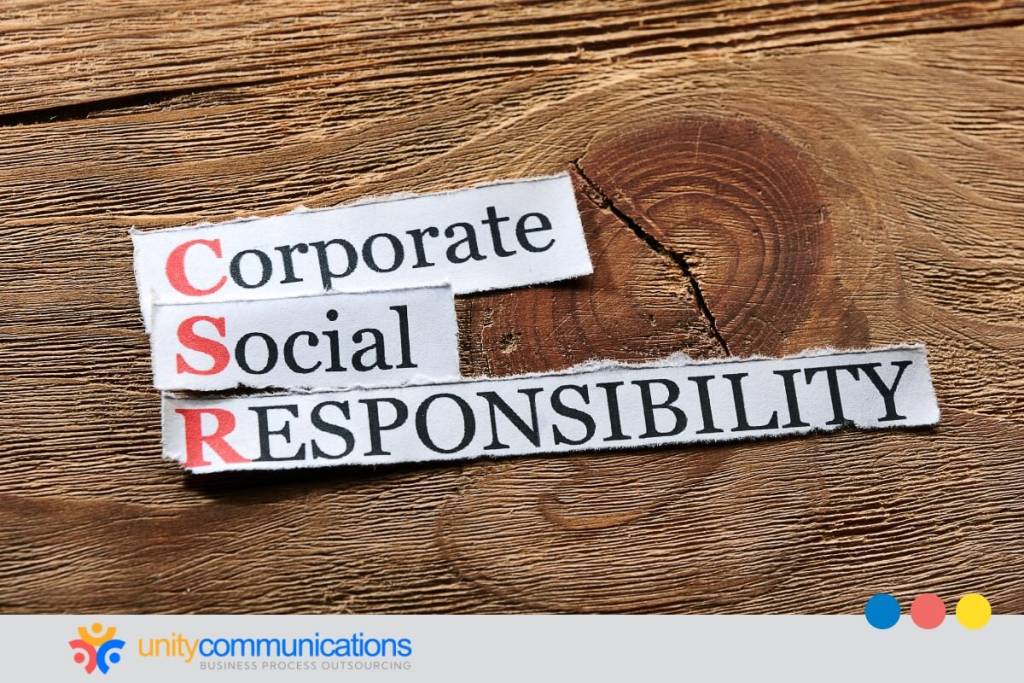Table of Contents
Corporate social responsibility (CSR) has become a fundamental business strategy, particularly in business process outsourcing (BPO). As companies expand their operations globally, they face increasing pressure to align their outsourced activities with regulatory requirements and ethical standards.
Understanding the legal landscape surrounding CSR and its impact on outsourcing is essential for businesses to mitigate risks, enhance brand reputation, and maintain operational efficiency.
This article explores the regulatory frameworks for CSR outsourcing and the challenges in navigating these complex requirements. Read below to examine the shift from voluntary to mandatory CSR compliance, the influence of international treaties, and the practical steps to sync outsourcing strategies with evolving CSR standards.
Global shift in CSR: From voluntary action to legal mandates

In many regions, CSR has evolved from a voluntary corporate initiative to a legally enforced obligation. Initially, companies invested in environmental protection, community development, and employee welfare as part of their broader commitment to the social good. However, these efforts were self-governed and lacked standardized oversight.
Over the past two decades, growing public awareness and stakeholder pressure have driven governments to formalize CSR expectations through legislation. The introduction of regulatory frameworks for CSR outsourcing, such as the European Union’s Non-Financial Reporting Directive (NFRD) and India’s Companies Act, which mandates specific CSR spending, reflects this shift.
Businesses are now accountable for their social and environmental impact, with governments and regulatory bodies requiring greater transparency and action. This shift has significant implications, especially for outsourcing in international business.
Companies and their BPO partners must follow the same CSR standards to avoid legal penalties, reputational damage, and loss of stakeholder trust. This increasing formalization reinforces the need to integrate CSR into outsourcing decisions through clear legal expectations, not just ethical intentions.
Key international agreements driving CSR in outsourcing
International treaties have significantly shaped how companies approach CSR in outsourcing. One is the United Nations Global Compact (UNGC), which outlines ten principles covering human rights, labor standards, environmental protection, and anti-corruption measures.
These include:
- Supporting and respecting the protection of internationally proclaimed human rights
- Upholding the freedom of association and effectively recognizing the right to collective bargaining
- Undertaking initiatives to promote greater environmental responsibility
- Working against corruption in all its forms, including extortion and bribery
- Eliminating discrimination in employment and occupation
In 2023, over 15,000 companies from more than 160 countries committed to these principles, underscoring UNGC’s global influence. Aligning with this initiative can enhance your reputation, meet stakeholder expectations, lower reputational risks, and showcase transparency.
The 2023 edition of the OECD Guidelines for Multinational Enterprises offers updated recommendations for responsible business conduct. These guidelines encompass areas like climate change, biodiversity, technology, business integrity, and supply chain due diligence. Although not legally binding, following these guidelines helps businesses prevent compliance issues and strengthen stakeholder trust.
Lastly, trade agreements such as the United States-Mexico-Canada Agreement (USMCA) have raised the stakes for CSR by embedding enforceable provisions on labor rights and environmental conservation. You must determine whether the outsourcing partner complies with the law to maintain cross-border access and avoid trade penalties.
Aligning with international regulatory frameworks for CSR outsourcing sets clear expectations and prevents non-compliance risks.
Legal obligations vs. voluntary CSR initiatives
The differences between legal obligations and voluntary CSR initiatives make business operations complex. Legal obligations include compliance with labor laws, environmental regulations, and corporate governance standards imposed by national and international authorities.
For example, the UK Modern Slavery Act requires companies to disclose efforts to prevent forced labor within their supply chains. At the same time, the EU’s Corporate Sustainability Reporting Directive (CSRD) mandates transparent reporting on social and environmental impact.
In contrast, voluntary CSR initiatives are actions companies undertake to enhance their reputation and stakeholder relationships beyond legal requirements. These might include:
- Investing in renewable energy
- Supporting local communities
- Improving employee welfare
Although the laws do not require these programs, they reflect stakeholder expectations and influence consumer behavior and brand loyalty.
The challenge lies in balancing these two. You must fulfill legal obligations while being able to pursue voluntary, brand-driven CSR initiatives to reduce legal and reputational risks and deepen stakeholder trust.
How environmental laws affect outsourcing practices
Environmental regulations can significantly influence outsourcing decisions. Governments worldwide are implementing stricter laws to reduce carbon emissions, manage waste, and protect biodiversity. These apply to domestic operations and outsourced activities, creating a ripple effect across global supply chains.
Global business leaders are responding to this shift. According to Deloitte’s 2024 CxO Sustainability Report, 85% of CxOs have increased sustainability investments in the past year, reflecting a growing commitment to environmental responsibility. This rise reflects how environmental laws shape regulatory frameworks for CSR outsourcing, compelling businesses to adapt quickly.
For example, the European Green Deal introduces mechanisms such as the Carbon Border Adjustment Mechanism (CBAM). The agreement imposes a carbon cost on imports from countries with less stringent climate policies, ensuring that imported goods meet EU environmental standards. If companies outsource to countries with weaker laws, they could face extra taxes or import limits. Carefully vetting BPO vendors’ environmental practices can avoid financial penalties and supply chain disruptions.
You can also mitigate risks by increasingly incorporating environmental compliance clauses into outsourcing contracts and conditions on regular audits and transparent reporting.
How labor laws impact compliance in CSR outsourcing

Labor laws are a critical component of regulatory frameworks for CSR outsourcing. Governments and international organizations have established labor standards to protect workers’ rights, including fair wages, safe working conditions, and freedom from discrimination and exploitation.
However, enforcement remains inconsistent across jurisdictions, creating compliance challenges for multinational corporations. For instance:
- According to the International Labour Organization (ILO), as of 2021, approximately 160 million children—63 million girls and 97 million boys—are engaged in child labor globally. This underscores the ongoing gaps in labor law enforcement.
- High-profile labor violations in outsourced factories, such as the Rana Plaza collapse in Bangladesh, further emphasized the risks of inadequate oversight.
In response, governments and industry bodies have introduced stricter labor laws and monitoring requirements. The Uyghur Forced Labor Prevention Act (UFLPA) bans the import of goods made with forced labor from Xinjiang unless companies can prove otherwise.
As a business, you can conduct more thorough due diligence to enhance compliance and boost competitive advantage. This includes performing third-party audits, establishing whistleblower mechanisms, and integrating labor standards into supplier contracts.
Corporate governance standards and CSR integration
Strong corporate governance is essential for effective CSR integration in outsourcing. Governance standards dictate how operations are run, ethical policies are set, and compliance is monitored.
Many jurisdictions have introduced governance-related CSR requirements, such as mandatory board-level oversight of sustainability projects. The U.S. Sarbanes-Oxley Act, for example, requires companies to establish internal controls and submit compliance reports. With robust governance structures, you can better enforce CSR standards across the supply chain.
Effective governance seamlessly integrates CSR policies into the business strategy and decision-making. This alignment helps maintain consistency in ethical and environmental practices, even in regions with varying regulatory frameworks for CSR outsourcing.
How consumer protection laws influence outsourcing contracts
Consumer protection laws have introduced another layer of complexity to the regulatory frameworks for CSR outsourcing. Those related to product safety, data privacy, and ethical marketing hold companies accountable for the actions of their outsourcing partners. For example, the EU’s General Data Protection Regulation (GDPR) requires your business to verify whether BPO partners handle consumer data securely and transparently.
If a third-party BPO or supplier fails to meet these standards, the outsourcing company can face legal and reputational consequences. In major markets, if a product made by an outsourcing partner has defects or safety issues, the parent company is still held responsible.
You can manage these risks by implementing stricter contractual agreements and monitoring performance and adherence. You can also require suppliers to meet specific consumer protection standards and conduct regular compliance audits. Proactively managing these issues helps build consumer trust and prevents costly legal disputes.
Overcoming global CSR compliance challenges
Aligning CSR standards across multiple jurisdictions remains one of the biggest challenges for multinational corporations. Countries have varying legal requirements, cultural norms, and enforcement mechanisms, making it difficult to establish consistent CSR practices.
For example:
- Bangladesh and Vietnam have lower minimum wages and fewer enforcement mechanisms than the European Union’s (EU) directives, which promote fair pay and limit excessive working hours.
- The EU’s Corporate Sustainability Reporting Directive (CSRD) requires companies to disclose detailed data on environmental impact and social responsibility to standardize sustainability efforts.
- Indonesia and India often rely on voluntary or less strict environmental frameworks. Inconsistencies make monitoring emissions, resource use, and waste management across supply chains complex in these countries.
To address these challenges, you can centralize CSR frameworks and set baseline standards while allowing regional flexibility. This approach helps you uphold core CSR principles while accommodating local variations.
A well-structured global strategy must integrate the most essential elements of regulatory frameworks for CSR outsourcing to avoid fragmentation and compliance blind spots.
Best practices to ensure CSR compliance in outsourcing

Managing CSR compliance in outsourcing contracts reduces risks and strengthens your reputation. Regulators, stakeholders, and consumers expect companies to uphold high labor practices, environmental impact, and governance standards.
What BPO partners can do is meet these expectations by aligning their operations with CSR guidelines. As a business owner, you can develop strong internal controls and oversight mechanisms to ensure compliance.
Here are some best practices for managing CSR efforts when outsourcing:
- Set clear performance metrics. Define specific targets for labor rights, environmental standards, and governance practices. Make sure these metrics are measurable and enforceable.
- Include compliance clauses. Contracts should outline regular audits, corrective actions, and termination rights in case of non-compliance to raise accountability and quickly resolve issues.
- Require regular reporting. Suppliers should provide consistent updates on CSR performance. Engage independent third-party auditors to verify the accuracy of these reports.
- Promote transparency. Maintain open communication with stakeholders. Transparency builds trust and reinforces accountability.
- Invest in training. Educate outsourcing partners on CSR expectations. Provide the necessary resources to help them meet these standards and strengthen long-term partnerships.
- Conduct risk assessments. Before engagement, evaluate potential partners for CSR risks, especially their labor practices, environmental impact, and compliance history.
- Establish grievance mechanisms. Offer secure and accessible channels for workers and stakeholders to report misconduct or violations. An effective grievance process encourages ethical behavior and detects issues early.
- Monitor local laws and global standards. Stay current with international regulations and local labor or environmental laws in your outsourcing regions. This keeps CSR practices compliant as legal frameworks evolve.
- Foster long-term partnerships. Work with vendors that demonstrate a shared commitment to CSR. Long-term collaboration supports continuous improvement and builds loyalty rooted in mutual values.
- Encourage innovation. Support suppliers in developing new, sustainable solutions. Recognizing and rewarding innovation can inspire higher performance and bring added value to your CSR initiatives.
Implementing these best practices helps transform CSR from a checkbox exercise into a core business strategy. It strengthens your supply chain, enhances brand credibility, and reduces long-term legal and reputational risks.
The bottom line
Integrating regulatory frameworks for CSR outsourcing is a strategic decision that improves BPO relationships, bolsters brand reputation, and ensures compliance. Your business gains a competitive advantage that boosts your chances of long-term success.
Ready to turn CSR compliance into a strategic advantage? Let’s connect to explore how strategic outsourcing can support your CSR goals.




